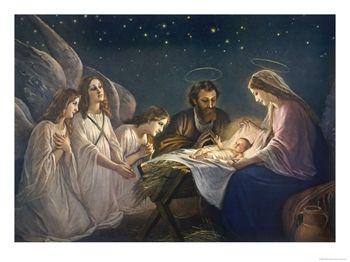The Meaning of Christmas
Christmas has nothing to do with giving people plenty of material possessions as "gifts". These gifts are self-centered and meaningless unless the true meaning of Christmas is told and celebrated. Material possessions are of this world and will be destroyed with this world. Giving "gifts" is not uniquely Christian, and other religions give gifts, heck, Wiccan's give each other gifts. In this time that can easily become nothing more than material and self obsession amidst retail insanity , let's remember the true meaning of Christmas.
LOVE - that's the true meaning of Christmas. John 3:16-17 says, "For God so loved the world, that He gave His only begotten Son, that whosoever believes in Him should not perish, but have everlasting life. For God sent not his Son into the world to condemn the world, but that the world through Him might be saved."
Philippians chapter 2, verses 6-11, as paraphrased in The Message, records, "Jesus had equal status with God but didn't think so much of Himself that He had to cling to the advantages of that status no matter what. Not at all. When the time came, He set aside the privileges of deity and took on the status of a slave, became human! Having become human, He stayed human. It was an incredibly humbling process. He didn't claim special privileges. Instead, He lived a selfless, obedient life and then died a selfless, obedient death - and the worst kind of death at that: a crucifixion. Because of that obedience, God lifted Him high and honored Him far beyond anyone or anything, ever, so that all created beings in heaven and on earth - even those long ago dead and buried - will bow in worship before this Jesus Christ, and call out in praise that He is the Master of all, to the glorious honor of God the Father."
The true meaning of Christmas is God's becoming a human being in the Person of Jesus Christ. Why did God do such a thing? Because He loves us! Why was Christmas necessary? Because we needed a Savior! Why does God love us so much? Because He is love (1 John 4:8)! Why do we celebrate Christmas each year? Out of gratitude for what God did for us, we remember His birth by giving each other gifts, worshipping Him, and being especially conscious of the poor and less fortunate.
The true meaning of Christmas is LOVE. God loved us so much that He wanted to provide a way for us to spend eternity with Him. He gave His only Son to take our punishment for our sins, He paid the price in full! We are free from condemnation when we accept that free gift of LOVE. "But God demonstrated His own love for us in this: while we were still sinners, Christ died for us"
(Romans 5:8).
(Thanks to GotQuestions.org)
Labels: Christian History, Christian Wisdom, COMMENTARY


















2 Comments:
Wasn't Jesus actually born sometime during summer or spring? I heard that Christmas was originally put on the 25th of December because the Church wanted to compete with the Wiccan's winter solstice holidays. I also heard that mistletoe's and lights on trees are also not Christian traditions. Doesn't Christmas mean "Mass of Christ"? Why don't we celebrate it when it actually happened instead of celebrating it in the middle of the winter?
By Anonymous, at 1:59 AM
Anonymous, at 1:59 AM
I don't want to leave your question unanswered, so I found the information I have always agreed on to support Christ's birth...
The 25th was a pagan festival...Tammuz. The Early church felt compelled to include this festival and eliminate competition by making Christ's birth the 25th.
Christmas is the "Christ Mass".
Here is an article from Dr. Missler on the date of Christ's birth. Take John the Baptist's birth and add 6 months per the Word of God...
Each year at Christmas we celebrate the birth of Jesus Christ. After the New Year, we struggle to remember to add a year as we date our checks, which should remind us that the entire Western World reckons its calendar from the birth of the One who changed the world more than any other before or since. Yet, it is disturbing to discover that much of what we have been taught about the Christmas season seems to be more tradition than truth.
Most serious Bible students realize that Jesus was probably not born on December 25th. The shepherds had their flocks in open fields, which implies a date prior to October. Furthermore, no competent Roman administrator would require registration involving travel during the season when Judea was generally impassable.
If Jesus wasn't born on December 25, just when was he born? Although the Bible doesn't explicitly identify the birthday of our Lord, many scholars have developed diverse opinions as to the likely birthday of Jesus.
The early Christian church did not celebrate Jesus' birth, and therefore the exact date was not preserved in festivals. The first recorded mention of December 25th is in the Calendar of Philocalus (AD 354), which assumed Jesus' birth to be Friday, December 25th, AD 1. This was subsequent to Constantine's Edict of Toleration in AD 313, which officially ended the government-sanctioned persecution of the Christians. The date of December 25th, which was officially proclaimed by the church fathers in AD 440, was actually a vestige of the Roman holiday of Saturnalia, observed near the winter solstice, which itself was among the many pagan traditions inherited from the earlier Babylonian priesthood.
The year of Jesus’ birth is broadly accepted as 4 BC, primarily from erroneous conclusions derived from Josephus’ recording of an eclipse, assumed to be on March 13, 4 BC, “shortly before Herod died.” There are a number of problems with this in addition to the fact that it was more likely the eclipse occurred on December 29, 1 B.C. Considerable time elapsed between Jesus’ birth and Herod’s death since the family fled to Egypt to escape Herod’s edict and they didn’t return until after Herod’s death. Furthermore, Herod died on January 14, 1 BC. Tertullian (born about 160 AD) stated that Augustus began to rule 41 years before the birth of Jesus and died 15 years after that event. Augustus died on August 19, 14 AD, placing Jesus’ birth at 2 BC. Tertullian also notes that Jesus was born 28 years after the death of Cleopatra in 30 BC, which is consistent with a date of 2 BC. Irenaeus, born about a century after Jesus, also notes that the Lord was born in the 41st year of the reign of Augustus. Since Augustus began his reign in the autumn of 43 BC, this also appears to substantiate the birth in 2 BC. Eusebius (264-340 AD), the “Father of Church History,” ascribes it to the 42nd year of the reign of Augustus and the 28th from the subjection of Egypt on the death of Anthony and Cleopatra. The 42nd year of Augustus ran from the autumn of 2 BC to the autumn of 1 BC. The subjugation of Egypt into the Roman Empire occurred in the autumn of 30 BC. The 28th year extended from the autumn of 3 BC to the autumn of 2 BC. The only date that would meet both of these constraints would be the autumn of 2 BC.
Another approach in determining the date of Jesus’ birth is from information about John the Baptist. Elisabeth, John’s mother, was a cousin of Mary and the wife of a priest named Zacharias who was of the “course” of Abijah (Priests were divided into 24 courses and each course officiated in the Temple for one week, from Sabbath to Sabbath). When the Temple was destroyed by Titus on August 5, 70 AD, the first course of priests had just taken office. Since the course of Abijah was the eighth course, we can track backwards and determine that Zacharias would have ended his duties on July 13, 3 BC. If the birth of John took place 280 days later, it would have been on April 19-20, 2 BC (precisely on Passover of that year). John began his ministry in the 15th year of Tiberius Caesar. The minimum age for the ministry was 30. As Augustus died on August 19, 14 AD, that was the accession year for Tiberius. If John was born on April 19-20, 2 BC, his 30th birthday would have been April 19-20, 29 AD, or the 15th year of Tiberius. This seems to confirm the 2 BC date and, since John was five months older, this also confirms the autumn birth date for Jesus.
Elisabeth hid herself for five months and then the Angel Gabriel announced to Mary both Elisabeth’s condition and that Mary also would bear a son who would be called Jesus. Mary went “with haste” to visit Elisabeth, who was then in the first week of her sixth month, or the fourth week of December, 3 BC. If Jesus was born 280 days later it would place the date of his birth on September 29, 2 BC. If Jesus was born on September 29, 2 BC, it is interesting to note that it was also the First of Tishri, the day of the Feast of Trumpets (see our briefing package on The Feasts of Israel).
By www.bibletruthonline.com, at 12:15 AM
www.bibletruthonline.com, at 12:15 AM
Post a Comment
Links to this post:
Create a Link
<< Home